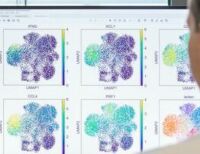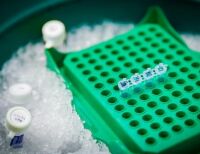Why do patients with a corona infection develop skin symptoms - and what can be observed from this?
Since the beginning of the Corona pandemic, we have learned that some skin changes occur with Covid-19 which we already know from other viral infectious diseases, such as hives or other rashes. Other skin alterations, however, are relatively or very specific to a corona infection: frostbite-like changes that occur primarily on the toes, hence the name "covid-toes." Rashes with blisters are also common, as is skin redness that follows the course of blood vessels, which can progress to tissue destruction. From this, we can learn some things that are important in Covid-19 in general: Frostbite-like changes are most common in children, adolescents, and young adults, often with asymptomatic or mild courses. Corona PCR tests will often remain negative in these cases, even though there have been instances of Covid-19 in the setting that make infection likely. In turn, skin rashes with blisters show that Sars-CoV2 coronaviruses can directly attack the cells of the epidermis and mucosa. In such cases, it is always possible to assume covid-19 disease. In the presence of reddenings that follow the course of vessels, with or without the destruction of tissue, there is a disturbance of the cells that coat the inside of the blood vessels. Activation of these cells then occurs, as well as platelets and clotting factors - changes that also appear in other organs in Covid-19: Skin changes such as these may provide an indication. They occur predominantly in moderately to severely affected patients.
Skin reactions can also occur after a Corona vaccination - which ones and what is the risk?
The vast majority of people tolerate a Corona vaccination without any problems: they feel a bit tired, sometimes a little sick or have a headache. A swollen arm may also occur with some delay. Such reactions are also known from other vaccinations. In addition, a non-specific activation of the immune system by the vaccination can occasionally worsen already existing skin diseases such as psoriasis or neurodermatitis for a short time or, extremely rarely, lead to their first appearance. All of these reactions are delayed and are easily treated. Reports of very rare allergic reactions of the immediate type and of allergic shock reactions (anaphylaxis) must be evaluated separately by allergists and vaccinologists. Patients often experience hives (urticaria) or a sudden and extensive reddening of the skin ("flush") shortly after vaccination. Respiratory distress and a severe drop in blood pressure may also occur, and very rarely circulatory failure. Such a strong reaction occurs mainly with mRNA vaccines. The risk is probably two to three times higher than with other vaccines, but still very low overall. Unfortunately, some media reports have led to uncertainty, but this is largely unnecessary: by no means all allergy sufferers have an increased risk. Patients who are only allergic to tree or grass pollen, bee or wasp stings, for example, do not have an increased risk.
How do you proceed when people state a history of allergies before they receive a vaccination?
For this purpose, an algorhithm was developed in a short time, which is stored at the Paul Ehrlich Institute (PEI) and shows how one should act depending on the initial situation. This was possible because a large proportion of reactions to mRNA vaccines are based on a specific allergy of the immediate type to larger polyethylene glycol molecules (PEGs, synonym: macrogols). Such molecules are present in the lipid envelope of mRNA vaccines from Moderna and Pfizer-BioNTech ("Corminaty"), but also in many everyday products. They are also ubiquitous in medicine, for example in laxatives, bowel cleanses, hydrogels or as excipients in pills and precisely in Moderna and Pfizer-BioNTech ("Corminaty"). Contact with them can lead to sensitization of the immune system in some people. This results in the formation of type E antibodies (immunoglobulin E, IgE). The IgE are then bound by certain immune cells that have a high-affinity receptor for IgE: Mast cells and basophilic granulocytes. Upon renewed contact with such PEGs - in this case, through mRNA vaccination - they can bind to the cell-bound IgE. This binding activates the cells, which then immediately release messenger substances. These messengers in turn lead to the reactions of an immediate-type allergy. For some patients, therefore, an appropriate investigation with skin or cellular tests (prick or intracutaneous test, basophil activation test) may be useful before vaccination. Patients in whom we have detected a PEG allergy in our clinic prior to vaccination already had a history of allergic reactions to PEGs, for example during preparation for a colonoscopy. These types of patients can be vaccinated with an alternate vaccine. For everyone else, the observation period is extended immediately after vaccination - according to the PEI's algorithm. Thus, for patients with PEG allergy, the warnings in the media are right. However, these reports concern only very few people.
Live stream „Reaktionen bei COVID19 und Corona-Impfung: Die Haut im Auge behalten“ on June 23, 6.15 pm
Display external content
At this point content of an external provider (source: www.xyz.de) is integrated. When displaying, data may be transferred to third parties or cookies may be stored, therefore your consent is required.
You can find more information and the possibility to revoke your consent at www.tum.de/datenschutz.
Talk in German
More information:
- Prof. Tilo Biedermann is director of the Clinic and Polyclinic for Dermatology and Allergology at the Klinikum rechts der Isar of TUM. His field of research includes the biology of the skin as well as immunology and allergology. He also works on the control of tolerance-mediated and inflammatory immune responses. His research spans from basic pathways to human applications.
- All talks of the Covid-19 Lectures
- The lecture is hosted by Prof. Marion Kiechle
















